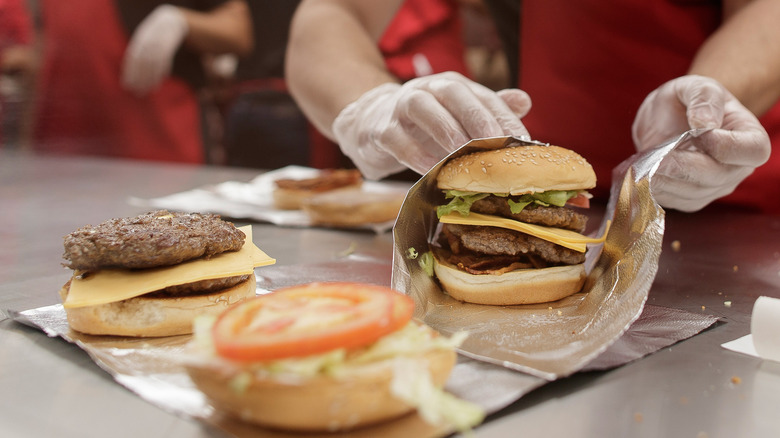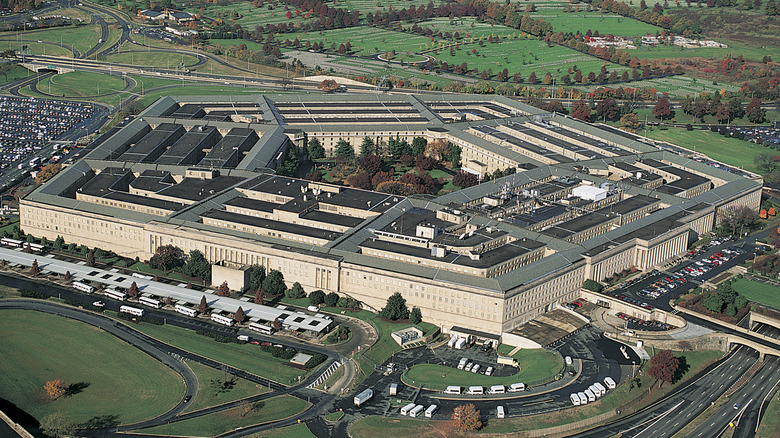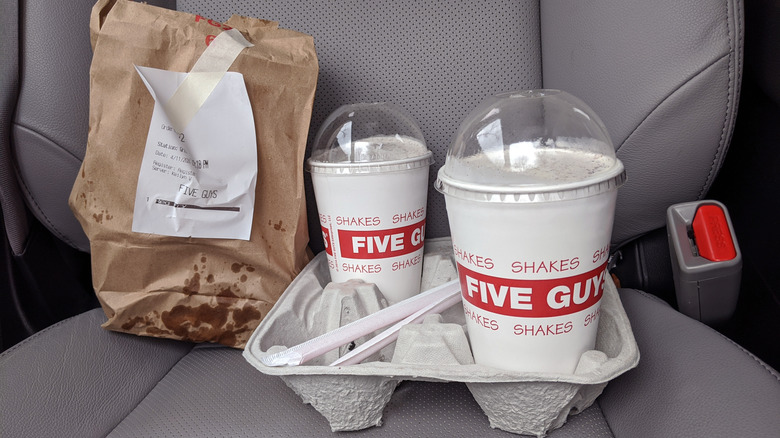Five Guys Once Denied Delivery To The Pentagon
Is a business allowed to say "no" when the U.S. military requests delivery from a food service establishment? Or would that be considered disobeying a direct order? Well, back in the day, Five Guys decided to find out.
"If you can give a good haircut or if you can serve a good drink at a bar or if you can serve a good hamburger, you can always make money in America," claimed the matriarch of the Murrel family — who collectively created Five Guys — once upon a time. When she, her husband, and their four boys (that's a total of five guys) started their fast-casual company in Arlington, Virginia circa 1986, Janie Murrel was proved right. Over the course of two decades, this venture was able to expand from a single location to a handful by serving hand-formed burgers and fresh-cut fries cooked in pure peanut oil. Gradually, Five Guys became a Washington, D.C. favorite.
Then, in 2003, per Nation's Restaurant News, the operation began to franchise and quickly expanded into hundreds of locations. Nowadays, Five Guys has more than a thousand sites scattered all across North America, the Middle East, Europe, and Asia. As recently as 2020, its annual sales totaled $1.6 billion. Even so, the organization has stayed true to its roots; it only uses fresh ground beef, it only uses peanut oil, and it only uses coolers, not freezers. It sticks to its guns, but so does the Pentagon.
How it all went down
Born and raised near the nation's capital, Five Guys is naturally popular there. So, it comes as no surprise that the folks working at Washington, D.C.'s Pentagon get a hankering for its food even when they're too busy to go pick it up. As reported by QSR Magazine, this exact scenario once resulted in the Pentagon ordering over a dozen burgers from the joint. There was just one problem: Five Guys didn't deliver.
"We don't believe in it," founder Jerry Murrel once claimed. "We think it cheapens the product." However, the Pentagon employs tens of thousands of people, and those individuals play a large part in the success or failure of any nearby restaurant. As such, one Pentagon employee informed Jerry that his business ultimately wouldn't survive if it didn't deliver. Still, Five Guys refused to fulfill the order, then put up a huge banner outside its Arlington site that read, "Absolutely No Delivery."
Obviously, Five Guys did in fact survive. The banner was an amazing clapback, and success is of course the best revenge, but the real kicker happened back in 2009. Per NBC News, then-President-and-commander-in-chief Barack Obama himself chose to patronize Five Guys in person one Friday afternoon. Obama greeted other guests, took a picture with the workers, and ordered several cheeseburgers to go (to share with staff). In the end, Five Guys very publicly got the last laugh.
Does Five Guys still not deliver?
Times have changed since 2009. According to FranchiseWire, the food service industry is evolving swiftly these days, due in large part to the pandemic. On-site dining has decreased by 16% since Covid hit, drive-thru's increased by 13%, and delivery's gone up by 5%. In order to facilitate such off-site business, many companies are turning more and more to technology, including apps. Plus, as inflation rises, lots of folks are eating out less, or at least, turning to cheaper fast-food options. Thus, adopting new strategies may prove essential to survival in the 2020s.
So, has Five Guys changed its mind about delivery yet? It's made other concessions in the past. For example, as documented by Nation's Restaurant News, it had previously refused to meet milkshake demand, but you can now find shakes on Five Guys' menu. Plus, Five Guys has a secret menu, allowing diners to customize their orders. Perhaps most surprising of all, though, Five Guys does deliver now! Even pre-pandemic, Five Guys had partnered up with services like Postmates to make its food accessible on demand throughout the United States (via PR Newswire).
So much for "Absolutely No Delivery!" It appears the almighty dollar is more persuasive than even the Pentagon.


